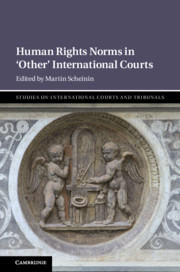46 results
1 - A Proposal for a Kantian Definition of Terrorism
- from Part I - The Globalization of Anti-Terrorism Law: Theoretical Frameworks
-
-
- Book:
- 9/11 and the Rise of Global Anti-Terrorism Law
- Published online:
- 01 July 2021
- Print publication:
- 15 July 2021, pp 15-33
-
- Chapter
- Export citation
“Could You, Would You, Should You?” Regulating Cross-Border Travel Through COVID-19 Soft Law in Finland
-
- Journal:
- European Journal of Risk Regulation / Volume 12 / Issue 1 / March 2021
- Published online by Cambridge University Press:
- 09 February 2021, pp. 26-44
-
- Article
- Export citation
Contributors
-
- Book:
- Human Rights Norms in ‘Other' International Courts
- Published online:
- 22 July 2019
- Print publication:
- 25 July 2019, pp vii-x
-
- Chapter
- Export citation
Table of Cases
-
- Book:
- Human Rights Norms in ‘Other' International Courts
- Published online:
- 22 July 2019
- Print publication:
- 25 July 2019, pp xiv-xxxvii
-
- Chapter
- Export citation
Acknowledgements
-
- Book:
- Human Rights Norms in ‘Other' International Courts
- Published online:
- 22 July 2019
- Print publication:
- 25 July 2019, pp xii-xiii
-
- Chapter
- Export citation
1 - How and Why to Assess the Relevance of Human Rights Norms in ‘Other’ International Courts
-
-
- Book:
- Human Rights Norms in ‘Other' International Courts
- Published online:
- 22 July 2019
- Print publication:
- 25 July 2019, pp 1-27
-
- Chapter
- Export citation
Subject Index
-
- Book:
- Human Rights Norms in ‘Other' International Courts
- Published online:
- 22 July 2019
- Print publication:
- 25 July 2019, pp 463-474
-
- Chapter
- Export citation
14 - Taking Stock: Relevance of Human Rights Norms in ‘Other’ International Courts
-
-
- Book:
- Human Rights Norms in ‘Other' International Courts
- Published online:
- 22 July 2019
- Print publication:
- 25 July 2019, pp 438-462
-
- Chapter
- Export citation
General Editors’ Preface
-
- Book:
- Human Rights Norms in ‘Other' International Courts
- Published online:
- 22 July 2019
- Print publication:
- 25 July 2019, pp xi-xi
-
- Chapter
- Export citation
Contents
-
- Book:
- Human Rights Norms in ‘Other' International Courts
- Published online:
- 22 July 2019
- Print publication:
- 25 July 2019, pp v-vi
-
- Chapter
- Export citation
Abbreviations
-
- Book:
- Human Rights Norms in ‘Other' International Courts
- Published online:
- 22 July 2019
- Print publication:
- 25 July 2019, pp xxxviii-xli
-
- Chapter
- Export citation
Copyright page
-
- Book:
- Human Rights Norms in ‘Other' International Courts
- Published online:
- 22 July 2019
- Print publication:
- 25 July 2019, pp iv-iv
-
- Chapter
- Export citation

Human Rights Norms in ‘Other' International Courts
-
- Published online:
- 22 July 2019
- Print publication:
- 25 July 2019
Samuel Moyn, Not Enough: Human Rights in an Unequal World, Harvard University Press, 2018, 296pp, ISBN 9780674737563 (hb), $29.95
-
- Journal:
- Leiden Journal of International Law / Volume 32 / Issue 3 / September 2019
- Published online by Cambridge University Press:
- 21 May 2019, pp. 609-613
- Print publication:
- September 2019
-
- Article
- Export citation
3 - Indirect Protection of Economic, Social and Cultural Rights in International Law
- from Part II - International Protection
-
-
- Book:
- The Protection of Economic, Social and Cultural Rights in Africa
- Published online:
- 03 November 2016
- Print publication:
- 20 October 2016, pp 72-88
-
- Chapter
- Export citation
8 - The Potential of the EU Charter of Fundamental Rights for the Development of the Rule of Law Indicators
- from Part II - Proposing New Approaches
-
-
- Book:
- Reinforcing Rule of Law Oversight in the European Union
- Published online:
- 27 October 2016
- Print publication:
- 13 October 2016, pp 172-186
-
- Chapter
- Export citation
Towards evidence-based discussion on surveillance: A Rejoinder to Richard A. Epstein
-
- Journal:
- European Constitutional Law Review / Volume 12 / Issue 2 / September 2016
- Published online by Cambridge University Press:
- 20 July 2016, pp. 341-348
- Print publication:
- September 2016
-
- Article
- Export citation
13 - Limits to freedom of expression: lessons from counter-terrorism
- from Part II - Selected thematic focuses
-
-
- Book:
- The United Nations and Freedom of Expression and Information
- Published online:
- 05 June 2015
- Print publication:
- 11 June 2015, pp 428-442
-
- Chapter
- Export citation
12 - European human rights as universal rights
- from Part 3 - 360° comparison
-
-
- Book:
- Shaping Rights in the ECHR
- Published online:
- 18 December 2013
- Print publication:
- 23 January 2014, pp 259-271
-
- Chapter
- Export citation
Contributors
-
-
- Book:
- Shaping Rights in the ECHR
- Published online:
- 18 December 2013
- Print publication:
- 23 January 2014, pp viii-ix
-
- Chapter
- Export citation



